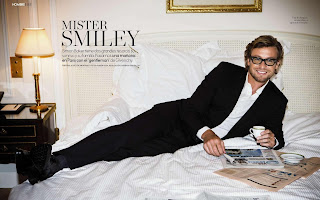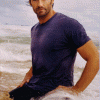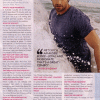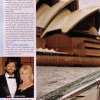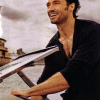星期四, 11月 03, 2016
星期三, 11月 02, 2016
星期六, 10月 29, 2016
星期六, 12月 12, 2015
星期五, 11月 20, 2015
《伊斯坦堡死亡紀事》(Istanbul Hartirasi)
這本書若說是推理小說,其中的推理成份很容易拆解,看到一半就應該很容易猜出誰是兇手了,但本書的重點,不在於推理,也不在於誰是兇手,而是作者在編寫兇手陳屍地點,所帶出的歷史、環境與對世事的關心,這才是本書的重點。
七個伊斯坦堡觀光名勝,就是七具屍體的陳屍地點,每發現一具屍體,就會一再將伊斯坦堡的歷史往前推進。因為作者是土耳其人,他本身對土國環境開發看來非常的關心,對官商勾結下,財團用盡各種名義來殘害歷史古蹟,來破壞環境,講的俱細彌遺,而且十分憂心忡忡。
對照我們最近發生一連串事情,忽然發現書中所描述的事情,也是完全在我們週遭發生的寫照。所以代入感很深,不會覺得故事是發生於遠在天邊,裏面作者所講的一字一句,好像就是在講我們現在所居住的城市(只是名勝古蹟沒那麼多)。
這本書也可複習一下伊斯坦堡的歷史,從拜占斯王建城開始,逛過書中七個古蹟,也好像走了七段歷史,從羅馬來到了現在,其中查士丁尼大帝屠城對照開發商為私利作開發而草菅人命,是作者特意的對比,伊斯坦堡多次從廢墟中重生,再次建下耀眼的古蹟,但如今的伊斯坦堡可以再次歷經這種「廢墟」般的剝削?
兇手從受害者到謀殺者的轉變,作者的前作《西台古墓死亡紀事》(Patasana)已經有用過,一樣用兇案過程來檢視是何種緣故,會令人從受害者走上謀殺者之路,兇手在受害者身份上,所失去的部份,其實與伊斯坦堡在被剝削摧毀的而消失的部份是一樣的,都是無力再追回的生命中的重要部份。
不過,本書不是每人都會有興趣,因為作者雖然帶領了讀者逛了伊斯坦堡七大名勝,但也不是每人都會有興趣想知道,而且每個名勝代表每個時代的軌跡,也不是每人都有興趣知道,作者還加了一堆歷史在上面,甚至也加了不少角色內心心情(主角是位總探長,作者用了很多章節描述他失去妻女的心情,與失去年少情愛的那段時光的心情,我明白是作者用來對比現代對代表過往歲月古蹟的摧殘,但還是覺得這段心情描述有點冗長,好幾次他和好友的聚會段落,我都是大約跳過的),所以令本書有點拖泥帶水。
而作者描述這些景點非常用心,令人有舊地重遊感覺,不管是提到聖索菲亞大教堂、托卡比皇宮,還是君士坦丁紀念碑,歷史與建築的互相輝映,這是本書引我興趣的另一原因(不過,這只是我自已的緣故)。看到作者對土耳其人對伊斯坦堡過往歷史漠不關心的憂心,對比之前新聞報導土耳其政府要將伊斯坦堡的一處公園複製成鄂圖曼軍營,再變成商場而引起的抗議,後演變成土耳其之春的行動,虛構的故事與真實時事相對比,令人非常的有感觸。
星期三, 4月 22, 2015
星期一, 12月 01, 2014
DA MAN Magazine

















Though you will likely recognize Richard Armitage from his day playing
action-hero roles on acclaimed British TV exports such as "Spooks"
and "Strike Back," he is now moving to higher ground. This winter, he returns as the
awe inspiring warrior King Thoring Oakenshield in director Peter Jackson’s “The Hobbit: The Battle of Five Armies.” An actor who knows what he likes, The strapping Armitage has a penchant
for dark and challenging roles, which allow him to give a powerful and
adrenaline-charged performance. Born in Lecicestershire in the north of
England, the relentless Armitage still believes he has a long way to go in the
field of action. We look forward to watching him climb to very top.
Da Man: Richard, you’re starring in the
momentous final installment of “The Hobbit.” Without giving too much away, what do we have to look forward to?
Richard Armitage: It’s the last piece of
Peter Jackson’s explorations of Tolkien’s works about Middle Earth, so expect the big finale before the curtain
falls. There is a big clue in the title, but rest assured that a pretty spectacular
battle is coming your way. As for my character Thoring, he is spiraling
downwards but will rise again like all the best tragic heroes in literature.
DA:What have you most enjoyed about playing Thoring Oakenshield, the King
of the Dwarves?
RA: I've enjoyed the duality of playing a
troubled being that is weighed down by the burdens of his past yet hopeful in
searching for a lost treasure and the chance of reclaiming his thorne. Thorin
has to overcome fear of failure but also the dreaded dragon sickness., which
makes him lust after gold over everything else. However, he has one of Tolkin’s
most legendary weapons on his side, the “Orcrist” sword, and, Boy, does he know
how to use it!
DA: you’re nearly 190 cm in height, was it
tough to envisage yourself as a dwarf?
RA: Yes, I laughed when they told me I was
going to be a dwarf. I still can’t see Thoring as vertically challenged, which
has actually been key to understanding him because he’s a legendary warrior
that stands head and shoulders above those in Middle earth, Metaphorically. What’s
more, we spent nearly two years acting like much bigger versions of ourselves
so that when Peter Jackson worked his digital magic, we didn't look like
children, but heavyset, bison-like warriors.
DA: Incredible. And can we ask how long
Thoring’s hair and makeup took?
RA: The first attempt was six hours, but
the brilliant and highly skilled Tami Lane(on prognostics), and Jennifer
Stanfield (hair and makeup) got it down to two and a half hours in the end.
DA: What has it been like working with
illustrious director Peter Jackson ?
RA: Peter fights for something beyond excellence,
he moves cinema forward. It’s an
uncompromising style and I found myself in a place of intense creativity, with
a lot of pressure to go beyond what I thought I was capable of in order to find
thorin. Peter guided me, listened to me, laughed at me, broke me and made me
look better than I really am. We tried to make Thorin aspiration for all his
fatal flaws, we wanted him to be “great” in the true sense of the word, someone
we would remember and who was worthy to
be spoken about in Tolkin’s universe for years to come.
DA: You spent two years shooting in
beautiful New Zealand. How was this experience?
RT: Incredible, beyond words. I still sense
New Zealand. I remember the sunrises of Paradise in the south and the fiery
sunsets of Nelson in the north. We were so often at the mercy of the weather,
like when a descending mist stranded half of the crew, but also the wonderful
human elements, such as when I ended upu trying to speaking Maori to native
Maori crowd!
DA: You've previously appeared on British
TV shows such as “Spooks” and “Strike Back” that have become popular globally.
What made these shows so successful?
RA: Both had their fingers on a political
pulse, with great characters in impossible situations. It’s all about a great
story being well told and a good helping of gripping action and engaging
locations on the side.
DA: It seems you often play commanding,
masculine roles. Is there a part of you
that identifies with such characters?
RA: I aspire to them. I've realized over the
years that I like to look at fallibility, rebirth and inner conflict. When that
is presented from within the commanding presence of powerful man (or dwarf), it
garners a certain dramatic tension. It’s why Titanic that sinks and towers that
fall fill us with such terror. I’m not really into fairy tales and happy endings.
I think it’s why I die a lot on screen and only got married once. We live in a
paternal world, and hacking away at the foundations of the seemingly
indestructible is very satisfying.
DA: So with this in mind, we talk it we won’t
be seeing you in any romantic comedies ?
RA: I always feel like a fake when I read
that material, I’m just better at the other stuff that involves melancholia and
irony. I look better in the dark.
DA: You’re one of a growing community of
English actors now living and having considerable success in the US. Why do you
think this is happening?
RA: Perhaps it’s connected to the last
question. Brooding distant, dark humor and irony, all provide great contrast to
that ”all-American” fee-good factor, but it’s always about balance. I also
think there is a great literary tradition in Europe: script first, picture
later. It can be the reverse in the US. Again, it’s a about a good balance of
opposite.
DA: From other British actors we've met, we
often hear about some kind of competition between people from the north of
England and people from the south. Can you please explain this to us?
RA: Well, ironically it’s coming up to the
10th anniversary of a BBC drama show I did called “North and South”
that pretty much explains it all. Essentially, the division originates from an
industrial north and serenely pastoral south that were products of the
industrial revolution in the early 19th century. Though it’s not so
much the case now, the north was all about coal mining, steel making, ship
building and “grand theft auto,” while in the south folks would be going to
ship at Harrods and see cultural performances at The Royal Albert Hall.
Needless to say, the Queen lives in the south of England!
DA: Though you career is dominated by TV
and movie appearances. We understand that you recently got back on stage?
RA: Yes, I played John Proctor in Arthur
Miller’s masterpiece “The Crucible,” which was performed at The Old Vic Theater
in London and directed by Yael Farber. It was a great event; we sold out and
received rave reviews. I couldn't have asked for a better return to the state
after a 12-year absence.
DA: Do you still get nerves before you go
stage in front of a large audience?
RA: Not nerves for the audience, but nerves
for what it is I’m about to take the character through. With my character
Proctor in “The Crucible,” it was huge,
like climbing a mountain. It was an extremely detailed and emotionally
destabilizing role; it was a three-and-a-half-hour play sometimes twice a day.
I’d ask myself, “Can I do this to myself )or rather John Proctor) again?” I shed
so may tars during those 12 weeks, I sometimes felt like I had nothing left.
Da: How did you earn your acting spurs
earlier on in your career?
RA: Actually, I don’t feel like I've earned
my acting spurs yet. Proctor was a big moment for me, but I believe that I've
got so much further to go. Thorin was
also a very significant role, deeply complex and Shakespearean in ts scale.
Often the fantasy genre is disregarded by critics, but thankfully not by
audiences.
DA: What is the most important quality that
an actor should possess?
RA: Patience.
DA: What rules do you live your life by?
RA: Treat others as you’d like to be
treated yourself—thanks Mum!
DA: What advice would you give to your
younger self?
RA: Practice your cello harder, and take that
offer to be part of the Leicestershire Schools Symphony Orchestra.
DA: How could you describe your own personal
style?
RA: Effort-full. People like to dress me up
as James Bond, but I’m happiest in jeans and a T-shirt, whith dirt on me, doing
something manual. Otherwise, everyone looks good in a well-fitted, white
button-down shirt and aviators.
DA: It seems like you have a pretty hectic
schedule. What do you do to relax?
RA: I’m pretty relaxed now… I must be
enjoying myself! [ Laughs]
DA: We have a New Year coming up in 2015.
Do you have any resolutions?
RA: Read more, dream more, smile more, eat
less, complain less, frown less. That’s enough for now.
Not Quite a Husband
所以她的作品是帶有點東方含蓄,與西方的大膽(羅曼史小說若沒令人臉紅心跳的情節出現,就不會叫做羅曼史小說了),但含蓄情感描述,是她書中重點。
不管是本書,或是Ravishing The Heiress,男女主角的感情培養是含蓄漸進的,本書男女主角在婚姻註銷後的三年,在艱困的印度邊界山區,兩人被迫重新面對之前的婚姻問題,也重新開啟內心感情的火花。而Ravishing The Heiress則是有名無實的夫妻,在婚姻合約到期前,兩人感情從無到有,從淡然到熱烈,中間過程,一個眼神、一個輕撫,或僅僅只是手放在對方的肩上,內心感情被引燃卻是如同黃色炸藥般強烈。
這本書我是對作者於當時印度邊界山區與歷史衝突,描述的印像深刻,在文中作者也說,苦力扛著浴盆在險峻的山區跋涉,與印度廚子在山區端出歐式甜點,她要是初看這情節,也覺得誇張,但她卻是有研究了相當多的當時書藉與文獻,去寫那段男女主角在惡劣的環境與時段,被迫自省的感情。
說實在,即使現在,遊覽印度山區,也不是很現代化的經驗,更何況是19世紀的印度山區邊界(但書中的地方,現在是在阿富汗與巴基斯坦那邊),她寫來很真實,令人覺得好像看到實景。
書中以一場暴動圍城來令男女主角面臨生死交關,才決定了真正的心意,但我覺得難寫的反而是後來兩人回到倫敦的時候,因為在生死交關之際,感情會激增,但回到平淡之後,感情的濃度是否依舊?作者還花了一小篇幅來描寫這段,畢竟是羅曼史小說,當然最後會解開彼此心結,而重新尋回對方。
不過,我總覺以雙方性格使然,再加上那個一開始令雙方婚姻破裂的因素,很有可能回到英國,還是一個在東、一個在西,收到對方的音訊會開心幻想個半天,但也僅此而已。
書中我喜歡兩段場景,一是兩人在夜裏要趁印人暴動之前,趕到英軍碉堡躲避,卻差點來不及,所以女主角拚命策馬,男主角拚命的擋住在後方追趕的印人,這場戲是在夜裏,以女主角視角所寫,所以看不到男主角搏鬥的可怕場景,但女主角拚了命策馬往前狂奔的強烈恐懼與擔心,最後是進了堡壘後,發現男主角身上大傷小傷不斷,衣服也殘破不堪,可見當時兩人處境有多兇險。
另一場是堡壘經過一夜印民強攻,隔天早上,太陽昇起,當男主角看到堡壘外面站著滿滿的穿著白衣的印民時,那種害怕與絕望,我看羅曼史不多,這場大場面我的經驗中好像還沒有(我果然愛看動作與大場面)。
作者在後記表示她為何喜歡寫19世紀的故事:那樣拘束的背景營造出絕佳的張力,情慾暗流蘊藏在眼神、言語以及交握略嫌太久的雙手中,給作家許多發揮空間。所以就是:suppression。
星期四, 3月 05, 2009
星期五, 2月 27, 2009
星期五, 11月 21, 2008
訂閱:
文章 (Atom)





















